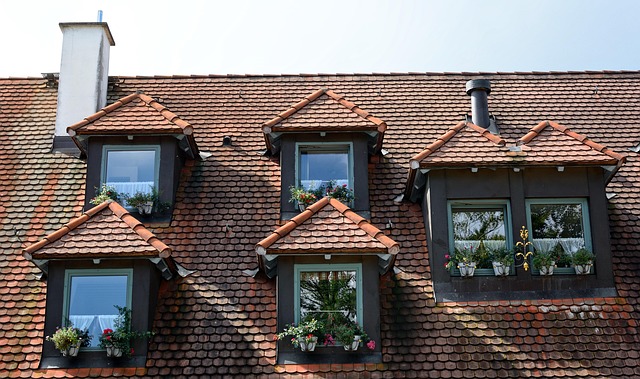Houston roofers face a crucial choice between flat and sloped roofs, each requiring specialized materials for optimal protection. Flat roofs, common in commercial spaces, offer modern aesthetics, lower initial costs, but struggle with heat absorption and leak prevention. Sloped roofs, favored locally, provide superior drainage, ventilation, durability, and energy efficiency despite higher upfront costs, aligning better with residential areas' structural needs and local climate conditions. Houston roofers must consider these factors to ensure the best choice for both commercial and residential properties.
Houston roofers are experts in installing both flat and sloped roofs for residential and commercial properties. This comprehensive guide delves into the intricacies of each installation type, highlighting the advantages and disadvantages of flat versus sloped roofs. We explore common roofing materials and discuss how skilled Houston roofers utilize proper techniques and safety measures to ensure long-lasting, durable, and aesthetically pleasing results, catering to diverse property needs.
- Understanding Roof Installation Types and Materials
- – Flat roof installation vs. sloped roof installation
Understanding Roof Installation Types and Materials

When it comes to roof installation, there are two primary types: flat and sloped roofs. Houston roofers often encounter a variety of materials used for these installations, each with unique benefits and applications. Flat roofs, common in commercial properties, require specific membranes and coatings that offer excellent resistance to leaks and withstand heavy weight. On the other hand, sloped roofs, typical in residential settings, demand specialized shingles or tiles designed to handle inclines while providing insulation and protection against extreme weather conditions.
Choosing the right materials is crucial for a successful installation. Houston roofers should consider factors like climate, budget, and building structure when selecting between options. For instance, durable, high-performance shingles might be ideal for areas prone to strong winds and storms, while energy-efficient underlayments can significantly improve insulation in colder climates. Understanding these variations ensures that both commercial and residential properties receive top-notch protection.
– Flat roof installation vs. sloped roof installation

When it comes to roofing, the choice between a flat and sloped design is an essential consideration for both residential and commercial buildings in Houston. Flat roofs offer a sleek, modern aesthetic, characterized by their even surface, making them a popular choice for contemporary structures. They require minimal maintenance and are generally more cost-effective to install compared to sloped roofs. However, they can be susceptible to heat absorption, leading to increased cooling costs during hot Houston summers.
In contrast, sloped roofs, with their angled surfaces, provide better drainage and ventilation, addressing the heat absorption issue. This design is especially beneficial for larger buildings, as it allows for efficient water runoff and reduces the risk of leaks. Houston roofers often recommend sloped roofs for their durability and ability to withstand harsh weather conditions. While they might be more expensive upfront, the long-term benefits in terms of structural integrity and energy efficiency make them a worthwhile investment.
When it comes to Houston roofers, choosing between flat and sloped roofs depends on your property’s unique needs. Both have their advantages, with flat roofs offering cost-effectiveness and low maintenance, while sloped roofs provide better water drainage. Understanding these options is key to ensuring a sturdy and reliable roofing system for your residential or commercial space. Trust the experts at Houston roofers to install or repair any roof type, guaranteeing superior craftsmanship and long-lasting protection.
